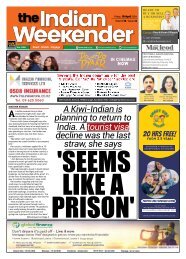The Indian Weekender, 13 November 2020
Weekly Kiwi-Indian publication printed and distributed free every Friday in Auckland, New Zealand
Weekly Kiwi-Indian publication printed and distributed free every Friday in Auckland, New Zealand
You also want an ePaper? Increase the reach of your titles
YUMPU automatically turns print PDFs into web optimized ePapers that Google loves.
18<br />
FIJI<br />
Friday, <strong>November</strong> <strong>13</strong>, <strong>2020</strong> <strong>The</strong> <strong>Indian</strong> <strong>Weekender</strong><br />
Free of virus for now – Fiji remains<br />
vigilant despite COVID-19 milestone<br />
On <strong>November</strong> 4, <strong>2020</strong> Fiji marked 200 days without any transmission of<br />
the coronavirus disease 2019 (COVID-19) in the community.<br />
<strong>The</strong> Pacific nation confirmed its first case on March 19, and as of<br />
<strong>November</strong> 4, <strong>2020</strong>, Fiji had recorded a total of 34 cases and two deaths.<br />
Its last instance of transmission in the community was April 18, <strong>2020</strong>.<br />
Early investment in testing capacity was crucial in helping the Pacific nation<br />
keep numbers low and prevent the virus’ transmission.<br />
Around the time that the first case was confirmed in mid-March, Fiji’s<br />
molecular laboratory at the Fiji Centre for Disease Control had validated<br />
testing for SARS-CoV-2, the virus that causes COVID-19, enabling Fiji to<br />
quickly test specimens, rather than sending them overseas.<br />
This enabled the country to test, trace and isolate, to quickly limit transmission.<br />
<strong>The</strong> World Health Organization (WHO) supported the Fijian Government to be<br />
ready to respond to the first cases, by placing an epidemiologist in the Ministry<br />
of Health and Medical Services.<br />
Since then, WHO has provided Fiji with priority supplies, including 888,500<br />
surgical masks, 53,400 N95 masks, 29,200 face shields, 2000 protective<br />
goggles, 4000 isolation gowns and 26,750 GeneXpert testing cartridges.<br />
Repatriation flights continue to bring Fijians home, and with them, the threat<br />
of new cases of COVID-19.<br />
<strong>The</strong> country has therefore put in place measures to quarantine returning<br />
citizens in Government-designated facilities for 14 days, and identify cases at<br />
the border. This has led to sporadic cases being identified in border quarantine,<br />
thanks to an extensive testing regime.<br />
Fiji has opened “Blue Lanes’ to visitors who travel to Fiji via yacht and<br />
pleasure craft. After spending 14 days at sea, these visitors are tested for the<br />
virus before being allowed to enter the country.<br />
“Fiji credits our 200-days of COVID Containment to a fast and early<br />
science-based approach, including the systematic identification and isolation<br />
of people infected with COVID-19, and quarantine of every known contact of<br />
confirmed cases.<br />
“Through it all we have safely repatriated through a rigorous system of<br />
border quarantine.<br />
“Our greatest enemy now is complacency. We must remain vigilant to keep<br />
the virus at bay, while positioning the Fijian economy for a recovery in the new<br />
normal,” said Fijian Prime Minister Voreqe Bainimarama.<br />
“Organising and managing quarantine for returning nationals is a challenge<br />
for every government. But when it is done properly, it is effective at limiting<br />
the importation of SARS-CoV-2.<br />
“Going 200 days without reporting any locally transmitted cases of<br />
New COVID-19 border<br />
quarantine case in Fiji<br />
Minister for Health and Medical Services, Dr<br />
Ifereimi Waqainabete and PS for Health Dr<br />
James Fong<br />
Fiji has a new border quarantine case of COVID-19.<br />
<strong>The</strong> Ministry of Health says the patient is a 53-yearold<br />
male Fijian citizen who arrived in Nadi on Thursday<br />
5th <strong>November</strong> <strong>2020</strong>, on a repatriation flight from New<br />
Zealand.<br />
His initial port of origin was United States of America.<br />
<strong>The</strong> Ministry says as with all prior border quarantine<br />
cases, this latest patient has been under strict border<br />
quarantine conditions since arrival into Nadi, at which time<br />
he began compulsory 14-day quarantine at a governmentdesignated<br />
quarantine facility under supervision from the<br />
Republic of Fiji Military Forces and the Health Ministry.<br />
<strong>The</strong> Ministry says the man has not displayed any<br />
symptoms since his arrival in Fiji.<br />
<strong>The</strong> entry test was conducted on day 2 of quarantine as<br />
part of the standard border process. Fiji has now had 35<br />
COVID-19 cases overall, and this new case is Fiji’s only<br />
active COVID case.<br />
<strong>The</strong> 53-year-old man remains in stable condition, and<br />
COVID-19 is a huge achievement.” said Dr Takeshi Kasai, WHO Regional<br />
director for the Western Pacific.<br />
At the same time, he cautioned that “while the virus is circulating globally,<br />
every country must remain vigilant and be ready to respond accordingly – in<br />
ways that are targeted and proportionate to the situation it faces.<br />
“Now is the time for Fiji – like other COVID-contained countries – to<br />
prepare for the eventual re-introduction of COVID-19.”<br />
Fiji plays an important regional role as medical supplies are warehoused<br />
in Fiji and it is a hub for Pacific Humanitarian Pathway flights, which are<br />
part of the global COVID-19 supply chain system, to Kiribati, Nauru, Tonga,<br />
Tuvalu and other neighbours. New Caledonia has also managed to avoid local<br />
transmission for over 200 days, with 27 cases and no deaths.<br />
Some Pacific countries and areas have not reported a single case to date.<br />
<strong>The</strong>y are American Samoa, Cook Islands, Kiribati, the Federated States<br />
of Micronesia, Nauru, Niue, Palau, Pitcairn Islands, Samoa, Tokelau, Tonga,<br />
Tuvalu and Vanuatu. However, others including Guam, Papua New Guinea<br />
and French Polynesia are currently experiencing outbreaks.<br />
WHO is supporting Fiji and other Pacific countries and areas through a<br />
COVID-19 Pacifi c Joint Incident Management Team (JIMT), through which<br />
the organisation co-ordinates partners to bring together resources and improve<br />
readiness to delay the spread of the virus and mitigate the negative health and<br />
socioeconomic impacts of COVID-19.<br />
has been transferred to the isolation ward at the Lautoka<br />
Hospital as per standard protocol for confirmed cases.<br />
<strong>The</strong> frontline border and quarantine staff who were<br />
directly involved with this patient will all be monitored<br />
and tested as necessary.<br />
<strong>The</strong> Ministry also states that this border quarantine case<br />
continues to pose zero risk to the health and wellbeing of<br />
the Fijian public.<br />
Prime Minister, Voreqe<br />
Bainimarama says today they<br />
are honouring the service and<br />
sacrifice of those people who have<br />
given their lives in combat but we<br />
should also remember that we fight<br />
many kinds of battles.<br />
While speaking at the<br />
Remembrance Day at CWM<br />
Hospital’s peace garden,<br />
Bainimarama says the CWM<br />
Hospital was built to remember the<br />
123 Fijian and British soldiers who<br />
left our shores with their arms more<br />
than a century ago to fight in the<br />
great war and did not return.<br />
Bainimarama says their names are<br />
on the plaque in the peace garden<br />
which stands as a fitting memorial to<br />
those soldiers because it is dedicated<br />
to healing.<br />
He says they could never bring<br />
those soldiers back but they can<br />
dedicate to saving lives, to curing<br />
sickness and keeping people healthy<br />
Girmit<br />
lineage<br />
hailed<br />
GIRMIT lineage in Fiji has<br />
made tremendous success in<br />
crucial aspects of our society,<br />
says Swami Vivekananda Cultural<br />
Centre (SVCC) director Santosh<br />
Mishra.<br />
“<strong>The</strong> sons and daughters of the<br />
girmitiya have proven that you are no<br />
less than anyone in the world,” he said<br />
during the annual Diwali celebrations<br />
that was jointly organised by the<br />
Fiji Girmit Council and the Swami<br />
Vivekananda Cultural Centre at the<br />
Girmit Centre in Lautoka.<br />
Mr Mishra said the girmit lineage<br />
in Fiji had come a long way in every<br />
aspect, especially in politics and<br />
education.<br />
“Your girmitiya forefathers have<br />
paved a better future for you through<br />
their hard work as indentured<br />
labourers, toiling for countless hours<br />
in the sugarcane fields.”<br />
He urged the many young people<br />
during the celebrations to follow in<br />
the footsteps of the successful Fijians<br />
of <strong>Indian</strong> descent in order to mould<br />
their lives.<br />
“<strong>The</strong> current generations can<br />
achieve everything if only they take<br />
heed of the advice of our elders,”<br />
said Mr Mishra.<br />
Today we are fighting many<br />
kinds of battles – Bainimarama<br />
in their name.<br />
<strong>The</strong> Prime Minister says the CWM<br />
Hospital opened to public in 1923<br />
with 108 beds and 27 staff.<br />
He says today there are over 500<br />
beds and around 2,000 staff.<br />
Fijians urged to abide by the designated time<br />
Fijians will be allowed to play<br />
with fireworks until 10pm on<br />
Sunday – the actual day of Diwali<br />
religious celebrations.<br />
FBC News can confirm that fireworks will<br />
only be allowed between 5pm and 10pm on the<br />
day, while authorities have allowed an extra<br />
two hours on Monday which is the designated<br />
public holiday.<br />
Manager for Mines Division at the Mineral<br />
Resources Department Raymond Mohammed<br />
says although people can light fireworks<br />
until midnight they still need to follow the<br />
curfew hours.<br />
“<strong>The</strong> only reminder to the individuals that<br />
are going to use fireworks is to use fireworks<br />
within the premises of your dwelling and<br />
residence from 5pm to 12 pm should be within<br />
the confines of the perimeters of your residence<br />
so that you are not breaking the curfew<br />
in place.”<br />
Mohammed says the approved extended<br />
hours from 5pm to 12 midnight apply only on<br />
the 16th of this month.<br />
He adds strict action will be taken against<br />
those who do not adhere to the designated<br />
times for lighting fireworks.<br />
“Basically in the fireworks regulations if you<br />
do not adhere to the approved fireworks usage<br />
hours you will be held liable to a fine of not<br />
more than $400 or imprisonment not less than<br />
6 months.”<br />
<strong>The</strong> Ministry of Lands and Mineral<br />
Resources has called on Fijians to celebrate<br />
responsibly and to keep in mind that Fiji is still<br />
observing COVID-19 related restrictions.


















